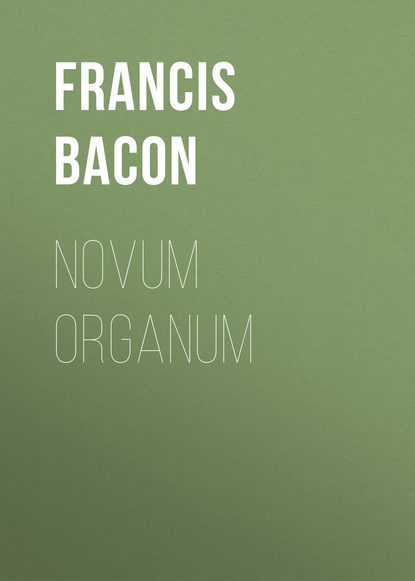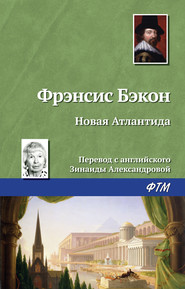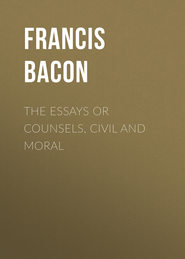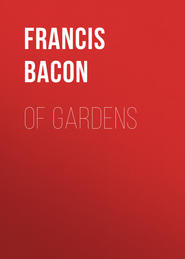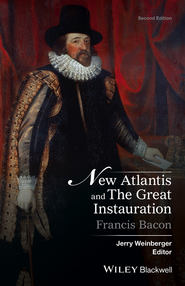По всем вопросам обращайтесь на: info@litportal.ru
(©) 2003-2024.
✖
Novum Organum
Настройки чтения
Размер шрифта
Высота строк
Поля
And it is worthy of remark in Solomon, that while he flourished in the possession of his empire, in wealth, in the magnificence of his works, in his court, his household, his fleet, the splendor of his name, and the most unbounded admiration of mankind, he still placed his glory in none of these, but declared[70 - Prov. xxv. 2.] that it is the glory of God to conceal a thing, but the glory of a king to search it out.
Again, let any one but consider the immense difference between men’s lives in the most polished countries of Europe, and in any wild and barbarous region of the new Indies, he will think it so great, that man may be said to be a god unto man, not only on account of mutual aid and benefits, but from their comparative states – the result of the arts, and not of the soil or climate.
Again, we should notice the force, effect, and consequences of inventions, which are nowhere more conspicuous than in those three which were unknown to the ancients; namely, printing, gunpowder, and the compass. For these three have changed the appearance and state of the whole world: first in literature, then in warfare, and lastly in navigation; and innumerable changes have been thence derived, so that no empire, sect, or star, appears to have exercised a greater power and influence on human affairs than these mechanical discoveries.
It will, perhaps, be as well to distinguish three species and degrees of ambition. First, that of men who are anxious to enlarge their own power in their country, which is a vulgar and degenerate kind; next, that of men who strive to enlarge the power and empire of their country over mankind, which is more dignified but not less covetous; but if one were to endeavor to renew and enlarge the power and empire of mankind in general over the universe, such ambition (if it may be so termed) is both more sound and more noble than the other two. Now the empire of man over things is founded on the arts and sciences alone, for nature is only to be commanded by obeying her.
Besides this, if the benefit of any particular invention has had such an effect as to induce men to consider him greater than a man, who has thus obliged the whole race, how much more exalted will that discovery be, which leads to the easy discovery of everything else! Yet (to speak the truth) in the same manner as we are very thankful for light which enables us to enter on our way, to practice arts, to read, to distinguish each other, and yet sight is more excellent and beautiful than the various uses of light; so is the contemplation of things as they are, free from superstition or imposture, error or confusion, much more dignified in itself than all the advantage to be derived from discoveries.
Lastly, let none be alarmed at the objection of the arts and sciences becoming depraved to malevolent or luxurious purposes and the like, for the same can be said of every worldly good; talent, courage, strength, beauty, riches, light itself, and the rest. Only let mankind regain their rights over nature, assigned to them by the gift of God, and obtain that power, whose exercise will be governed by right reason and true religion.
CXXX. But it is time for us to lay down the art of interpreting nature, to which we attribute no absolute necessity (as if nothing could be done without it) nor perfection, although we think that our precepts are most useful and correct. For we are of opinion, that if men had at their command a proper history of nature and experience, and would apply themselves steadily to it, and could bind themselves to two things: 1, to lay aside received opinions and notions; 2, to restrain themselves, till the proper season, from generalization, they might, by the proper and genuine exertion of their minds, fall into our way of interpretation without the aid of any art. For interpretation is the true and natural act of the mind, when all obstacles are removed: certainly, however, everything will be more ready and better fixed by our precepts.
Yet do we not affirm that no addition can be made to them; on the contrary, considering the mind in its connection with things, and not merely relatively to its own powers, we ought to be persuaded that the art of invention can be made to grow with the inventions themselves.
APHORISMS – BOOK II
ON THE INTERPRETATION OF NATURE, OR THE REIGN OF MAN
I. To generate and superinduce a new nature or new natures, upon a given body, is the labor and aim of human power: while to discover the form or true difference of a given nature, or the nature[71 - Τὸ τὶ ἦν εἶναι, or ἦν οὐσία of Aristotle. – See lib. iii. Metap.] to which such nature is owing, or source from which it emanates (for these terms approach nearest to an explanation of our meaning), is the labor and discovery of human knowledge; and subordinate to these primary labors are two others of a secondary nature and inferior stamp. Under the first must be ranked the transformation of concrete bodies from one to another, which is possible within certain limits; under the second, the discovery, in every species of generation and motion, of the latent and uninterrupted process from the manifest efficient and manifest subject matter up to the given form: and a like discovery of the latent conformation of bodies which are at rest instead of being in motion.
II. The unhappy state of man’s actual knowledge is manifested even by the common assertions of the vulgar. It is rightly laid down that true knowledge is that which is deduced from causes. The division of four causes also is not amiss: matter, form, the efficient, and end or final cause.[72 - These divisions are from Aristotle’s Metaphysics, where they are termed, 1. ὓλη ἢ τὸ ὑποκείμενον. 2. τὸ τὶ ἦν εἶναι. 3. ὅθεν ἡ ἀρχὴ τῆς κινήσεως. 4. τὸ οὗ ἕνεκεν – καὶ τὸ ἀγαθόν.] Of these, however, the latter is so far from being beneficial, that it even corrupts the sciences, except in the intercourse of man with man. The discovery of form is considered desperate. As for the efficient cause and matter (according to the present system of inquiry and the received opinions concerning them, by which they are placed remote from, and without any latent process toward form), they are but desultory and superficial, and of scarcely any avail to real and active knowledge. Nor are we unmindful of our having pointed out and corrected above the error of the human mind, in assigning the first qualities of essence to forms.[73 - See Aphorism li. (#Book_I_Aph_51) and second paragraph of Aphorism lxv. (#Book_I_Aph_65_para_2) in the first book.] For although nothing exists in nature except individual bodies,[74 - Bacon means, that although there exist in nature only individualities, yet a certain number of these may have common properties, and be controlled by the same laws. Now, these homogeneous qualities which distinguish them from other individuals, lead us to class them under one expression, and sometimes under a single term. Yet these classes are only pure conceptions in Bacon’s opinion, and cannot be taken for distinct substances. He evidently here aims a blow at the Realists, who concluded that the essence which united individualities in a class was the only real and immutable existence in nature, inasmuch as it entered into their ideas of individual substances as a distinct and essential property, and continued in the mind as the mold, type or pattern of the class, while its individual forms were undergoing perpetual renovation and decay. —Ed.] exhibiting clear individual effects according to particular laws, yet in each branch of learning, that very law, its investigation, discovery, and development, are the foundation both of theory and practice. This law, therefore, and its parallel in each science, is what we understand by the term form,[75 - Bacon’s definition is obscure. All the idea we have of a law of nature consists in invariable sequence between certain classes of phenomena; but this cannot be the complete sense attached by Bacon to the term form, as he employs it in the fourth aphorism (#Book_II_Aph_4) as convertible with the nature of any object; and again, in the first aphorism (#Book_II_Aph_1), as the natura naturans, or general law or condition in any substance or quality —natura naturata– which is whatever its form is, or that particular combination of forces which impresses a certain nature upon matter subject to its influence. Thus, in the Newtonian sense, the form of whiteness would be that combination of the seven primitive rays of light which give rise to that color. In combination with this word, and affording a still further insight into its meaning, we have the phrases, latens processus ad formam, et latens schematismus corporum. Now, the latens schematismus signifies the internal texture, structure, or configuration of bodies, or the result of the respective situation of all the parts of a body; while the latens processus ad formam points out the gradation of movements which takes place among the molecula of bodies when they either conserve or change their figure. Hence we may consider the form of any quality in body as something convertible with that quality, i. e., when it exists the quality is present, and vice versâ. In this sense, the form of a thing differs only from its efficient cause in being permanent, whereas we apply cause to that which exists in order of time. The latens processus and latens schematismus are subordinate to form, as concrete exemplifications of its essence. The former is the secret and invisible process by which change is effected, and involves the principle since called the law of continuity. Thus, the succession of events between the application of the match to the expulsion of the bullet is an instance of latent progress which we can now trace with some degree of accuracy. It also more directly refers to the operation by which one form or condition of being is induced upon another. For example, when the surface of iron becomes rusty, or when water is converted into steam, some change has taken place, or latent process from one form to another. Mechanics afford many exemplifications of the first latent process we have denoted, and chemistry of the second. The latens schematismus is that visible structure of bodies on which so many of their properties depend. When we inquire into the constitution of crystals, and into the internal structure of plants, we are examining into their latent schematism. —Ed.] adopting that word because it has grown into common use, and is of familiar occurrence.
III. He who has learned the cause of a particular nature (such as whiteness or heat), in particular subjects only, has acquired but an imperfect knowledge: as he who can induce a certain effect upon particular substances only, among those which are susceptible of it, has acquired but an imperfect power. But he who has only learned the efficient and material cause (which causes are variable and mere vehicles conveying form to particular substances) may perhaps arrive at some new discoveries in matters of a similar nature, and prepared for the purpose, but does not stir the limits of things which are much more deeply rooted; while he who is acquainted with forms, comprehends the unity of nature in substances apparently most distinct from each other. He can disclose and bring forward, therefore (though it has never yet been done), things which neither the vicissitudes of nature, nor the industry of experiment, nor chance itself, would ever have brought about, and which would forever have escaped man’s thoughts; from the discovery of forms, therefore, results genuine theory and free practice.
IV. Although there is a most intimate connection, and almost an identity between the ways of human power and human knowledge, yet, on account of the pernicious and inveterate habit of dwelling upon abstractions, it is by far the safest method to commence and build up the sciences from those foundations which bear a relation to the practical division, and to let them mark out and limit the theoretical. We must consider, therefore, what precepts, or what direction or guide, a person would most desire, in order to generate and superinduce any nature upon a given body: and this not in abstruse, but in the plainest language.
For instance, if a person should wish to superinduce the yellow color of gold upon silver, or an additional weight (observing always the laws of matter) or transparency on an opaque stone, or tenacity in glass, or vegetation on a substance which is not vegetable, we must (I say) consider what species of precept or guide this person would prefer. And, first, he will doubtless be anxious to be shown some method that will neither fail in effect, nor deceive him in the trial of it; secondly, he will be anxious that the prescribed method should not restrict him and tie him down to peculiar means, and certain particular methods of acting; for he will, perhaps, be at loss, and without the power or opportunity of collecting and procuring such means. Now if there be other means and methods (besides those prescribed) of creating such a nature, they will perhaps be of such a kind as are in his power, yet by the confined limits of the precept he will be deprived of reaping any advantage from them; thirdly, he will be anxious to be shown something not so difficult as the required effect itself, but approaching more nearly to practice.
We will lay this down, therefore, as the genuine and perfect rule of practice, that it should be certain, free and preparatory, or having relation to practice. And this is the same thing as the discovery of a true form; for the form of any nature is such, that when it is assigned the particular nature infallibly follows. It is, therefore, always present when that nature is present, and universally attests such presence, and is inherent in the whole of it. The same form is of such a character, that if it be removed the particular nature infallibly vanishes. It is, therefore, absent, whenever that nature is absent, and perpetually testifies such absence, and exists in no other nature. Lastly, the true form is such, that it deduces the particular nature from some source of essence existing in many subjects, and more known (as they term it) to nature, than the form itself. Such, then, is our determination and rule with regard to a genuine and perfect theoretical axiom, that a nature be found convertible with a given nature, and yet such as to limit the more known nature, in the manner of a real genus. But these two rules, the practical and theoretical, are in fact the same, and that which is most useful in practice is most correct in theory.
V. But the rule or axiom for the transformation of bodies is of two kinds. The first regards the body as an aggregate or combination of simple natures. Thus, in gold are united the following circumstances: it is yellow, heavy, of a certain weight, malleable and ductile to a certain extent; it is not volatile, loses part of its substance by fire, melts in a particular manner, is separated and dissolved by particular methods, and so of the other natures observable in gold. An axiom, therefore, of this kind deduces the subject from the forms of simple natures; for he who has acquired the forms and methods of superinducing yellowness, weight, ductility, stability, deliquescence, solution, and the like, and their degrees and modes, will consider and contrive how to unite them in any body, so as to transform[76 - By the recent discoveries in electric magnetism, copper wires, or, indeed, wires of any metal, may be transformed into magnets; the magnetic law, or form, having been to that extent discovered.] it into gold. And this method of operating belongs to primary action; for it is the same thing to produce one or many simple natures, except that man is more confined and restricted in his operations, if many be required, on account of the difficulty of uniting many natures together. It must, however, be observed, that this method of operating (which considers natures as simple though in a concrete body) sets out from what is constant, eternal, and universal in nature, and opens such broad paths to human power, as the thoughts of man can in the present state of things scarcely comprehend or figure to itself.
The second kind of axiom (which depends on the discovery of the latent process) does not proceed by simple natures, but by concrete bodies, as they are found in nature and in its usual course. For instance, suppose the inquiry to be, from what beginnings, in what manner, and by what process gold or any metal or stone is generated from the original menstruum, or its elements, up to the perfect mineral: or, in like manner, by what process plants are generated, from the first concretion of juices in the earth, or from seeds, up to the perfect plant, with the whole successive motion, and varied and uninterrupted efforts of nature; and the same inquiry be made as to a regularly deduced system of the generation of animals from coition to birth, and so on of other bodies.
Nor is this species of inquiry confined to the mere generation of bodies, but it is applicable to other changes and labors of nature. For instance, where an inquiry is made into the whole series and continued operation of the nutritive process, from the first reception of the food to its complete assimilation to the recipient;[77 - Haller has pursued this investigation in his “Physiology,” and has left his successors little else to do than repeat his discoveries. —Ed.] or into the voluntary motion of animals, from the first impression of the imagination, and the continuous effects of the spirits, up to the bending and motion of the joints; or into the free motion of the tongue and lips, and other accessories which give utterance to articulate sounds. For all these investigations relate to concrete or associated natures artificially brought together, and take into consideration certain particular and special habits of nature, and not those fundamental and general laws which constitute forms. It must, however, be plainly owned, that this method appears more prompt and easy, and of greater promise than the primary one.
In like manner the operative branch, which answers to this contemplative branch, extends and advances its operation from that which is usually observed in nature, to other subjects immediately connected with it, or not very remote from such immediate connection. But the higher and radical operations upon nature depend entirely on the primary axioms. Besides, even where man has not the means of acting, but only of acquiring knowledge, as in astronomy (for man cannot act upon, change, or transform the heavenly bodies), the investigation of facts or truth, as well as the knowledge of causes and coincidences, must be referred to those primary and universal axioms that regard simple natures; such as the nature of spontaneous rotation, attraction, or the magnetic force, and many others which are more common than the heavenly bodies themselves. For let no one hope to determine the question whether the earth or heaven revolve in the diurnal motion, unless he have first comprehended the nature of spontaneous rotation.
VI. But the latent process of which we speak, is far from being obvious to men’s minds, beset as they now are. For we mean not the measures, symptoms, or degrees of any process which can be exhibited in the bodies themselves, but simply a continued process, which, for the most part, escapes the observation of the senses.
For instance, in all generations and transformations of bodies, we must inquire, what is in the act of being lost and escaping, what remains, what is being added, what is being diluted, what is being contracted, what is being united, what is being separated, what is continuous, what is broken off, what is urging forward, what impedes, what predominates, what is subservient, and many other circumstances.
Nor are these inquiries again to be made in the mere generation and transformation of bodies only, but in all other alterations and fluctuations we must in like manner inquire; what precedes, what succeeds, what is quick, what is slow, what produces and what governs motion, and the like. All which matters are unknown and unattempted by the sciences, in their present heavy and inactive state. For, since every natural act is brought about by the smallest efforts,[78 - Bacon here first seems pregnant with the important development of the higher calculus, which, in the hands of Newton and Descartes, was to effect as great a revolution in philosophy as his method. —Ed.] or at least such as are too small to strike our senses, let no one hope that he will be able to direct or change nature unless he have properly comprehended and observed these efforts.
VII. In like manner, the investigation and discovery of the latent conformation in bodies is no less new, than the discovery of the latent process and form. For we as yet are doubtless only admitted to the antechamber of nature, and do not prepare an entrance into her presence-room. But nobody can endue a given body with a new nature, or transform it successfully and appropriately into a new body, without possessing a complete knowledge of the body so to be changed or transformed. For he will run into vain, or, at least, into difficult and perverse methods, ill adapted to the nature of the body upon which he operates. A clear path, therefore, toward this object also must be thrown open, and well supported.
Labor is well and usefully bestowed upon the anatomy of organized bodies, such as those of men and animals, which appears to be a subtile matter, and a useful examination of nature. The species of anatomy, however, is that of first sight, open to the senses, and takes place only in organized bodies. It is obvious, and of ready access, when compared with the real anatomy of latent conformation in bodies which are considered similar, particularly in specific objects and their parts; as those of iron, stone, and the similar parts of plants and animals, as the root, the leaf, the flower, the flesh, the blood, and bones, etc. Yet human industry has not completely neglected this species of anatomy; for we have an instance of it in the separation of similar bodies by distillation, and other solutions, which shows the dissimilarity of the compound by the union of the homogeneous parts. These methods are useful, and of importance to our inquiry, although attended generally with fallacy: for many natures are assigned and attributed to the separate bodies, as if they had previously existed in the compound, which, in reality, are recently bestowed and superinduced by fire and heat, and the other modes of separation. Besides, it is, after all, but a small part of the labor of discovering the real conformation in the compound, which is so subtile and nice, that it is rather confused and lost by the operation of the fire, than discovered and brought to light.
A separation and solution of bodies, therefore, is to be effected, not by fire indeed, but rather by reasoning and true induction, with the assistance of experiment, and by a comparison with other bodies, and a reduction to those simple natures and their forms which meet, and are combined in the compound; and we must assuredly pass from Vulcan to Minerva, if we wish to bring to light the real texture and conformation of bodies, upon which every occult and (as it is sometimes called) specific property and virtue of things depends, and whence also every rule of powerful change and transformation is deduced.
For instance, we must examine what spirit is in every body,[79 - By spirit, Bacon here plainly implies material fluid too fine to be grasped by the unassisted sense, which rather operates than reasons. We sometimes adopt the same mode of expression, as in the words spirits of nitre, spirits of wine. Some such agency has been assumed by nearly all the modern physicists, a few of whom, along with Bacon, would leave us to gather from their expressions, that they believe such bodies endowed with the sentient powers of perception. As another specimen of his sentiment on this subject, we may refer to a paragraph on the decomposition of compounds, in his essay on death, beginning – “The spirit which exists in all living bodies, keeps all the parts in due subjection; when it escapes, the body decomposes, or the similar parts unite.” —Ed.] what tangible essence; whether that spirit is copious and exuberant, or meagre and scarce, fine or coarse, aëriform or igniform, active or sluggish, weak or robust, progressive or retrograde, abrupt or continuous, agreeing with external and surrounding objects, or differing from them, etc. In like manner must we treat tangible essence (which admits of as many distinctions as the spirit), and its hairs, fibres, and varied texture. Again, the situation of the spirit in the corporeal mass, its pores, passages, veins, and cells, and the rudiments or first essays of the organic body, are subject to the same examination. In these, however, as in our former inquiries, and therefore in the whole investigation of latent conformation, the only genuine and clear light which completely dispels all darkness and subtile difficulties, is admitted by means of the primary axioms.
VIII. This method will not bring us to atoms,[80 - The theory of the Epicureans and others. The atoms are supposed to be invisible, unalterable particles, endued with all the properties of the given body, and forming that body by their union. They must be separated, of course, which either takes a vacuum for granted, or introduces a tertium quid into the composition of the body.] which takes for granted the vacuum, and immutability of matter (neither of which hypotheses is correct), but to the real particles such as we discover them to be. Nor is there any ground for alarm at this refinement as if it were inexplicable, for, on the contrary, the more inquiry is directed to simple natures, the more will everything be placed in a plain and perspicuous light, since we transfer our attention from the complicated to the simple, from the incommensurable to the commensurable, from surds to rational quantities, from the indefinite and vague to the definite and certain; as when we arrive at the elements of letters, and the simple tones of concords. The investigation of nature is best conducted when mathematics are applied to physics. Again, let none be alarmed at vast numbers and fractions, for in calculation it is as easy to set down or to reflect upon a thousand as a unit, or the thousandth part of an integer as an integer itself.
IX.[81 - Compare the three following aphorisms with the last three chapters of the third book of the “De Augmentis Scientiarum.”] From the two kinds of axioms above specified, arise the two divisions of philosophy and the sciences, and we will use the commonly adopted terms which approach the nearest to our meaning, in our own sense. Let the investigation of forms, which (in reasoning at least, and after their own laws), are eternal and immutable, constitute metaphysics,[82 - Bacon gives this unfortunate term its proper signification; μετα, in composition, with the Greeks signifying change or mutation. Most of our readers, no doubt, are aware that the obtrusion of this word into technical philosophy was purely capricious, and is of no older date than the publication of Aristotle’s works by Andronicus of Rhodes, one of the learned men into whose hands the manuscripts of that philosopher fell, after they were brought by Sylla from Athens to Rome. To fourteen books in these MSS. with no distinguishing title, Andronicus is said to have prefixed the words τα μετα τα φυσικα, to denote the place which they ought to hold either in the order of Aristotle’s arrangement, or in that of study. These books treat first of those subjects which are common to matter and mind; secondly, of things separate from matter, i. e. of God, and of the subordinate spirits, which were supposed by the Peripatetics to watch over particular portions of the universe. The followers of Aristotle accepted the whimsical title of Andronicus, and in their usual manner allowed a word to unite things into one science which were plainly heterogeneous. Their error was adopted by the Peripatetics of the Christian Church. The schoolmen added to the notion of ontology, the science of the mind, or pneumatology, and as that genus of being has since become extinct with the schools, metaphysics thus in modern parlance comes to be synonymous with psychology. It were to be wished that Bacon’s definition of the term had been accepted, and mental science delivered from one of the greatest monstrosities in its nomenclature, yet Bacon whimsically enough in his De Augmentis includes mathematics in metaphysics. —Ed.] and let the investigation of the efficient cause of matter, latent process, and latent conformation (which all relate merely to the ordinary course of nature, and not to her fundamental and eternal laws), constitute physics. Parallel to these, let there be two practical divisions; to physics that of mechanics, and to metaphysics that of magic, in the purest sense of the term, as applied to its ample means, and its command over nature.
X. The object of our philosophy being thus laid down, we proceed to precepts, in the most clear and regular order. The signs for the interpretation of nature comprehend two divisions; the first regards the eliciting or creating of axioms from experiment, the second the deducing or deriving of new experiments from axioms. The first admits of three subdivisions into ministrations. 1. To the senses. 2. To the memory. 3. To the mind or reason.
For we must first prepare as a foundation for the whole, a complete and accurate natural and experimental history. We must not imagine or invent, but discover the acts and properties of nature.
But natural and experimental history is so varied and diffuse, that it confounds and distracts the understanding unless it be fixed and exhibited in due order. We must, therefore, form tables and co-ordinations of instances, upon such a plan, and in such order that the understanding may be enabled to act upon them.
Even when this is done, the understanding, left to itself and to its own operation, is incompetent and unfit to construct its axioms without direction and support. Our third ministration, therefore, must be true and legitimate induction, the very key of interpretation. We must begin, however, at the end, and go back again to the others.
XI. The investigation of forms proceeds thus: a nature being given, we must first present to the understanding all the known instances which agree in the same nature, although the subject matter be considerably diversified. And this collection must be made as a mere history, and without any premature reflection, or too great degree of refinement. For instance; take the investigation of the form of heat.
Instances agreeing in the Form of Heat
1. The rays of the sun, particularly in summer, and at noon.
2. The same reflected and condensed, as between mountains, or along walls, and particularly in burning mirrors.
3. Ignited meteors.
4. Burning lightning.
5. Eruptions of flames from the cavities of mountains, etc.
6. Flame of every kind.
7. Ignited solids.
8. Natural warm baths.
9. Warm or heated liquids.
10. Warm vapors and smoke; and the air itself, which admits a most powerful and violent heat if confined, as in reverberating furnaces.
11. Damp hot weather, arising from the constitution of the air, without any reference to the time of the year.
12. Confined and subterraneous air in some caverns, particularly in winter.
13. All shaggy substances, as wool, the skins of animals, and the plumage of birds, contain some heat.
14. All bodies, both solid and liquid, dense and rare (as the air itself), placed near fire for any time.
15. Sparks arising from the violent percussion of flint and steel.





